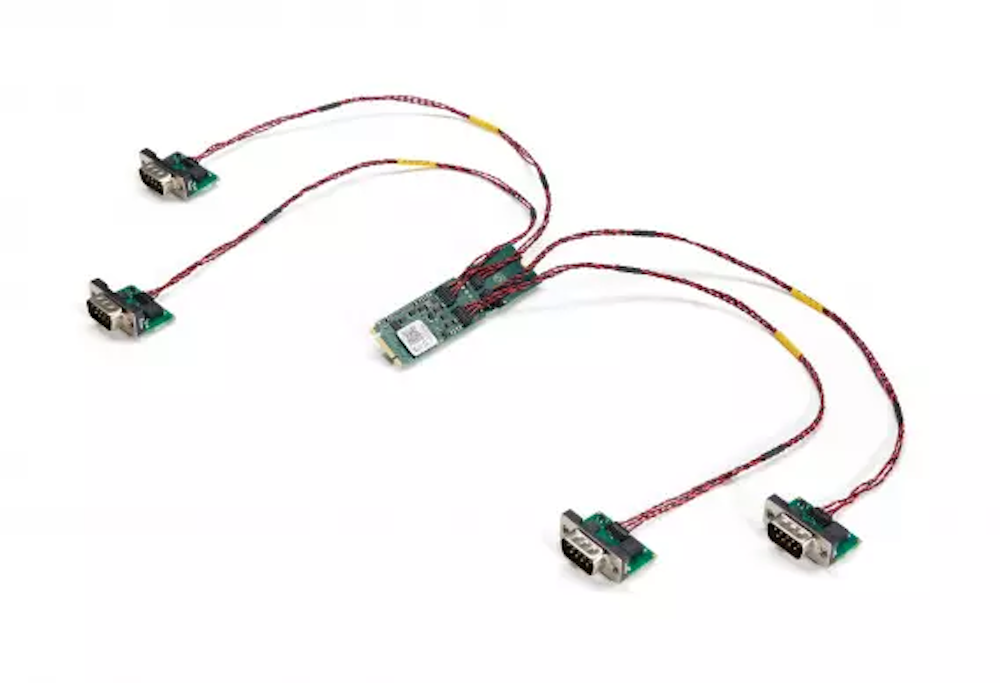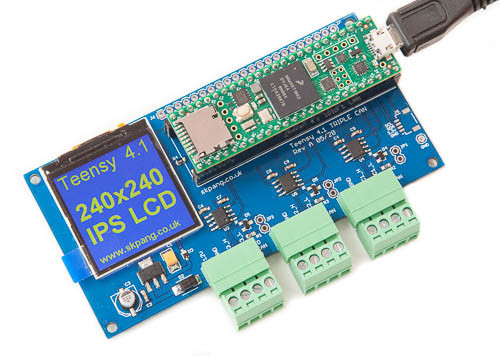Blog
Recent Posts
PCI Express Board Integrates Four High-Speed CAN/CAN FD Ports
Posted by on
Kvaser has introduced their compact M.2 PCIe, a highly integrated embedded CAN Bus board that adds four high-speed CAN/CAN FD channels to any host computer with PCI Express connectivity and an available B or M keyed M.2 slot.
The embedded board provides four distributed CAN CC (Classic CAN) or CAN FD transceivers, adding CAN CC and CAN FD to any host computer with a PCI Express connector. The board has a compact footprint due to an M.2 card size of 22 x 80 mm and a height of only 2 mm. Unique to the Kvaser M.2 PCIe 4xCAN is that the CAN transceivers are off board, allowing them to reside closer to the CAN network. This layout maximizes the signal speed and integrity, making it suitable for CAN FD since CAN FD supports data phase bit rates up to 8 Mbit/s.
Each CAN module connects to the M.2 card using a 30-cm long PCB-to-PCB cabling. The distributed CAN layout is specifically suited for embedded systems with enclosures. Each CAN channel is galvanically isolated. The board’s operating temperature is within the standard industrial range of -40 °C to +85 °C. With a timestamp resolution of 1 μs and a maximum message rate of 20000 frames/s per channel, plus features such as silent mode, error frame detection and generation, the board supports a wide range of embedded systems. Examples include motor control for mobile robotics, automated driving simulation black boxes, CAN Bus data acquisition in medical automation, fleet management, industrial system monitoring, and more.
Kvaser’s free-of-charge CANlib SDK (software development kit) supports the development of user application software. CANlib, which supports Windows and Linux, allows the development of applications that are fully compatible with present and future Kvaser hardware. Kvaser offers M2M communication solutions that provide innovative and trusted CAN interfaces to engineers designing and deploying systems in transportation, industrial automation, avionics, construction equipment, building automation, domestic appliances, marine, medical, military, railway, and telecoms. The company also supplies design services for OEM (original equipment manufacturer) and ODM (original design manufacturer) customers.
Teensy 4.1 Triple CAN Bus Board with Two CAN 2.0B And One CAN FD Port With 240x240 IPS LCD
The Teensy 4.1 Triple CAN Bus Board with 240x240 IPS LCD is a Teensy 4.1 board with triple CAN Bus connections, two Classical CAN 2.0B, and one CAN FD. It can be powered by an external +12 VDC power supply with reverse voltage protection. Also included is a 240x240 wide-angle IPS TFT LCD display.
The Teensy 4.1 is an Arduino-compatible board with an Arm Cortex-M7 microcontroller running at 600 MHz. The board is compatible with the Arduino IDE and the Arduino library. In most cases, code written for another Arduino board works with a minimum of changes on a Teensy.
ESP32: CAN Bus Programming with MCP2515 and MCP2517FD
For good reasons, the ESP32 processor is a prevalent choice for embedded hardware development. Besides considerable memory resources, it provides various hardware features for many applications, most prominently the Internet of Things (IoT). All that comes with more than reasonable price tags, specifically when you use one of the multiple ESP32 development modules. And since [...]
Kvaser's Leaf v3 Supports Classical CAN and CAN FD in Silent Mode
Every professional CAN Bus development, may it be Classical CAN, CAN FD, or higher layer protocols such as SAE J1939, require a data monitoring device for a proof of functionality. Kvaser has introduced such a device, the Leaf v3 interface supporting Classial CAN and CAN FD in optional Silent Mode. The Leaf series depicts one of the [...]
Industrial Strength Dual CAN FD Interface in Mini PCIe Format
The VL-MPEu-C1 module by Versalogic, compliant with the Mini PCIe format, is a tiny and rugged dual-channel CAN Bus add-on interface. It supports CAN-FD for high-speed data transfer but is still fully compatible with CAN 2.0 A and CAN 2.0 B (Classical CAN). It supports additional CAN functions, including message acceptance filtering, listen-only mode, and wake-up [...]
Under Development: Programmable CAN Bus to USB, Bluetooth, BLE, WiFi Gateway
For the longest time, I had resisted the idea of creating my version of a CAN-to-USB gateway, primarily due to the vast competition. A professional CAN/J1939 development requires a professional CAN-to-PC solution to monitor data traffic. I am pleased with the PEAK PCAN-USB device, as shown in the above image. However, not everybody is willing [...]
Mini PCI-E Module Integrates Classical CAN (CAN bus 2.0 A/B, OBDII, SAE J1939), CAN FD, and GNSS features
Antzer Tech, a subsidiary of Innodisk, introduced their GADN-FD7L0 PC interface card, which integrates CAN (CAN bus 2.0 a/b, OBDII, SAE J1939), CAN FD, and GNSS features into one mini PCI-E combo module. The board comes in a standard Mini PCI Express form factor. It supports USB 2.0 and two independent CAN FD ports with data-phase bit [...]
Programmable ECU and GPS Modules with Classical CAN, CAN FD, SAE J1939 Connections
PEAK-System presented several innovative I/O products with Classical CAN and CAN FD connections in this year's Embedded World trade show. The versatile control unit PCAN-MicroMod FD ECU integrates customer-specific accessories for automotive applications. For this purpose, the device offers a CAN FD connection and a combination of analog and digital I/Os. The I/O processing and message [...]
Automotive Power Management IC with LIN and CAN-FD Interfaces
The SPSB081 by STMicroelectronics is a power management chip providing electronic control units (ECU) with power management functionality. It supports CAN FD and, optionally, comes with LIN transceivers. The SPSB081 operates at various standby modes with programmable local and remote wake-up capabilities to minimize power consumption. The chip has a low-drop voltage regulator to supply the host microcontroller [...]
Standard IoT Gateway with ARM i.MX8M Plus Quad-Core Cortex-A53 Supports Two CAN FD Ports
Aaeon, a manufacturer of reliable and high-quality computing platforms, introduced their SRG-IMX8P IoT gateway solution with two CAN FD interfaces, bringing extended connectivity and utility across vertical markets. It is powered by Arm NXP i.MX8M Plus quad-core Cortex-A53 and Cortex-M7 processors with 8 GiB of onboard DDR4, the device reduces object detection time to 13 msec [...]
ESP32 Triple CAN Bus Application Through Adding Two MCP2515 Ports
The first question that may arise when talking about accessing the MCP2515 CAN Bus controller per ESP32 may be, "Why would you need an MCP2515 controller when the ESP32 comes with an internal CAN port?" Yes, I found this question in one of the online forums while researching this particular topic. The answer is easy: [...]
 Loading... Please wait...
Loading... Please wait...


